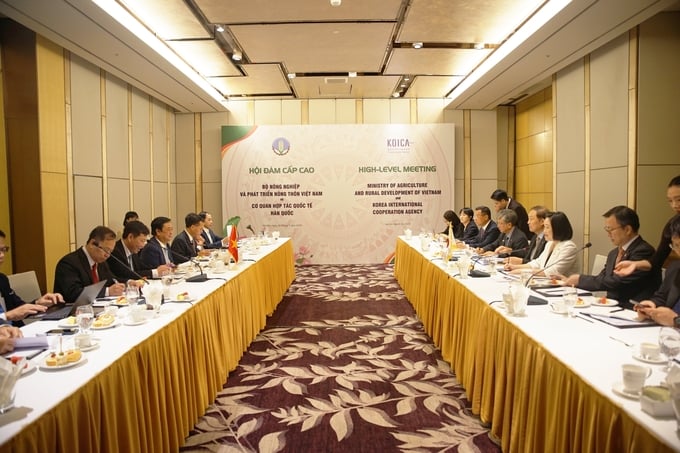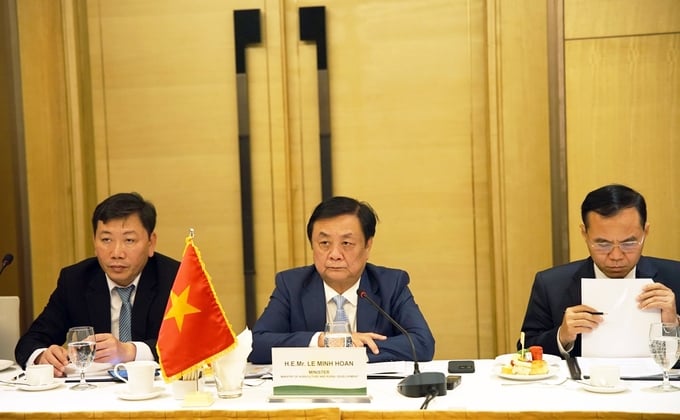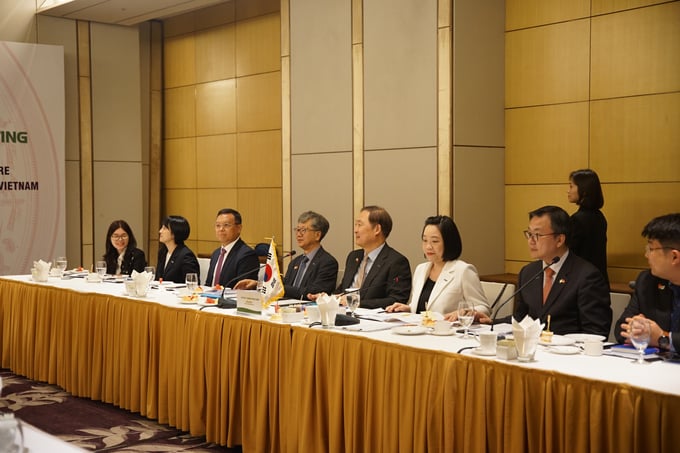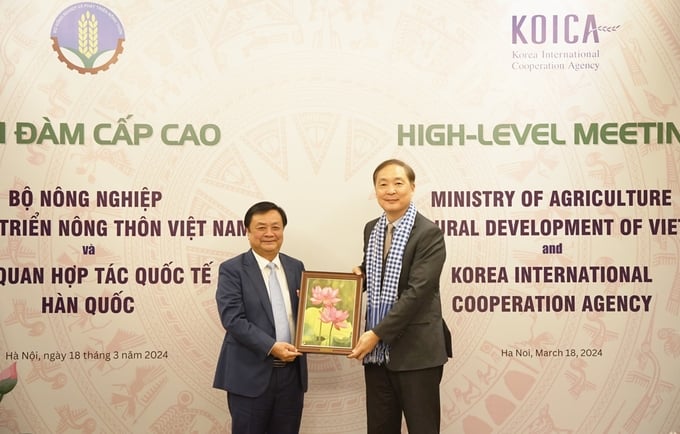June 16, 2025 | 09:35 GMT +7
June 16, 2025 | 09:35 GMT +7
Hotline: 0913.378.918
June 16, 2025 | 09:35 GMT +7
Hotline: 0913.378.918

The high-level dialogue took place on the sidelines of the Vietnam - South Korea Cooperation Vision Conference in agriculture until 2030.
On March 18, Minister of Agriculture and Rural Development Le Minh Hoan met with the President of the Korea International Cooperation Agency (KOICA), Chang Won Sam, on the sidelines of the Vietnam-Korea Cooperation Vision Workshop in Agriculture until 2030.
Minister Le Minh Hoan stated that Vietnam has always valued its relationship with South Korea, which includes KOICA and associated organizations, throughout the last decade. South Korea's ODA and FDI initiatives, particularly in agriculture, have contributed significantly to overall development by assisting with policy formation and improving the capacities of Vietnamese farmers.
The MARD's leadership also highlighted their travel to South Korea last year, at the request of the South Korean Ministry of Forestry. They were given the opportunity to tour forestry organizations, research institutes, and Konkuk University. Minister Le Minh Hoan expressed respect for South Korea's scientific research accomplishments and sophisticated technological applications in agricultural product production and processing, reaffirming Vietnam's willingness to collaborate and exchange experiences in the future.
According to the MARD's head, the Strategy for Sustainable Agricultural and Rural Development for the period 2021-2030, with a vision to 2050 and three pillars: "Ecological agriculture - Modern rural areas - Civilized farmers," has incorporated some experiences from South Korea's agricultural and rural development.

Minister Le Minh Hoan emphasized the vision of Vietnam - South Korea agricultural cooperation.
To attain the aforementioned aims, Vietnam need international collaboration and support, particularly from South Korea.On this premise, I hope and think that executing the Vietnam-South Korea Cooperation Vision would result in major future advantages for both countries' agricultural and rural development," Minister Le Minh Hoan stated.
To effectively implement the Vietnam-South Korea Cooperation Vision, Minister Le Minh Hoan proposed that KOICA leaders pay attention to focused guidance, expand support in six priority cooperation areas identified in the Vision Report, align with the Comprehensive Agriculture and Rural Development Plan until 2030, and implement the MARD's Restructuring Agricultural Sector Project.

Mr. Chang stated that the South Korean government will continue to increase the scale of funding for ODA development cooperation projects, and agricultural projects will be prioritized on this list.
The Ministry of Agriculture and Rural Development (MARD) hopes to learn from South Korea's experiences through technical assistance programs in cooperation, research, and development of eco-tourism and community-based tourism linked with promoting trade in specialty agricultural products in rural Vietnam; Cooperation and development of models applying digital transformation to build smart and civilized new rural communes (the Saemaul Undong movement is very effective and widespread in South Korea); Development of smart agriculture models, sustainable development, emission reduction, and adaptation to climate change in key production areas; Cooperation and technology transfer to develop circular agriculture models for some potential commercial sectors between Vietnam and South Korea; Improvement of policies and supply chain systems for agricultural products and food to meet the requirements of new-generation trade regulations; Establishment of a commercial agricultural data bank and enhancement of standardization capacity of databases to serve the digital transformation process in agricultural trade management.
Regarding South Korea, KOICA President Chang Won Sam stated that KOICA has several agribusiness projects in Vietnam.
"South Korea has achieved great advances in agriculture. Despite not concentrating much on agriculture, we believe it is the most significant fundamental industry in the Korean economy. "This view has not changed despite the emergence of new agricultural economic sectors," Mr. Chang stated.

Minister Le Minh Hoan (left) presents a souvenir gift to Mr. Chang Won Sam, President of KOICA.
In reality, KOICA constantly prioritizes and picks agricultural and rural development initiatives. Mr. Chang noted that KOICA thinks that via these collaborative initiatives, both South Korea and Vietnam would gain and accomplish the intended outcomes.
Mr. Chang stressed the relevance of KOICA Vietnam in connecting MARD Vietnam with KOICA, allowing both parties to collaborate and develop initiatives in Vietnam. Mr. Chang underlined that KOICA is dedicated to ensuring that this partnership benefits all sides, not just one.
Second, the South Korean government will continue to expand financing for ODA development cooperation projects, with agricultural initiatives receiving priority on this list.
Third, regardless of which project is picked for implementation, Vietnam would prioritize it in accordance with the country's development requirements and conditions.
During the discussion, KOICA's leadership requested that MARD speed the project approval process, allowing programs to be executed promptly, efficiently, and on time.
Translated by Dieu Linh
![Turning wind and rain into action: [4] Bringing climate bulletins to remote and isolated areas](https://t.ex-cdn.com/nongnghiepmoitruong.vn/608w/files/linhnhp/2025/06/14/1152-z6704423696987_15fd32ffc26d590d204d520c9dac6786-nongnghiep-151141.jpg)
(VAN) The Vietnam Agriculture and Nature Newspaper interviewed Mr. Vu Thai Truong, Acting Head of Climate Change and Environment at UNDP Vietnam, to gain deeper insight into how climate bulletins are delivered to farmers.

(VAN) In Tien Giang, a high-tech shrimp farm has developed a distinctive energy-saving farming model that has yielded promising results.
![Turning wind and rain into action: [3] 300.000 farmers benefit from agro-climatic bulletins](https://t.ex-cdn.com/nongnghiepmoitruong.vn/608w/files/news/2025/06/12/e5a48259d6a262fc3bb3-nongnghiep-125122.jpg)
(VAN) The agro-climatic bulletin has become a valuable tool for farmers in the Mekong Delta. After more than five years of implementation, the initiative is gradually being expanded nationwide.
![Turning wind and rain into action: [2] Providing forecasts to the people](https://t.ex-cdn.com/nongnghiepmoitruong.vn/608w/files/news/2025/06/12/e5a48259d6a262fc3bb3-nongnghiep-103927.jpg)
(VAN) In addition to improving the quality of hydrometeorological forecasts, putting forecast bulletins into practical use is crucial for production and disaster prevention.

(VAN) Blue carbon is receiving attention for its rapid absorption capacity and vast potential. It represents a promising nature-based solution to respond to climate change.
/2025/06/11/3507-1-161904_583.jpg)
(VAN) Seagrass beds and coral reefs serve as 'cradles' that nurture life in the ocean depths, creating rich aquatic resources in Vietnamese waters.
![Turning wind and rain into action: [1] Forecasting for farmers](https://t.ex-cdn.com/nongnghiepmoitruong.vn/608w/files/news/2025/06/11/e5a48259d6a262fc3bb3-nongnghiep-111919.jpg)
(VAN) Weather is no longer just a matter of fate. Forecasts have now become an essential companion for farmers in every crop season.